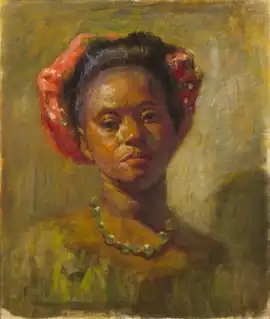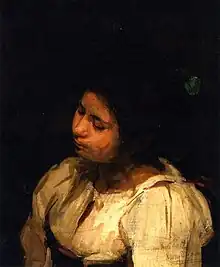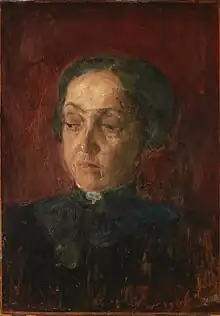Woman from the West Indies
Woman From the West Indies is a painting by Henry Ossawa Tanner painted about 1891 in Brittany, France, during his first or second summer in France.[1][2] The portrait is unsigned but is attributed to Tanner based on the way it was painted, compared to Tanner's known works from 1891-1893.[1] Those examining the painting looked for patterns in the way the artist used color, the brush strokes, and the stylistic choices in how light itself is shown in the painting.[1]
| Woman from the West Indies | |
|---|---|
 Woman from the West Indies, by Henry Ossawa Tanner. | |
| Artist | Henry Ossawa Tanner |
| Year | c. 1891 |
| Medium | oil on canvas mounted on board |
| Dimensions | (18 inches in × 15 inches in) |
This work may have influenced Julius Bloch in making his painting, The Man with the Blue Sweater.[1]
Representing light
Looking at stylistic representation of light in the painting revealed a similarity to The Banjo Lesson.[1] In that work, Tanner had painted to show the effects of two light sources, a window casting blue light and a fire casting warm colors.[3][4] In Woman From the West Indies, the artist also chose multiple light sources.[1] Dewey F. Mosby[upper-alpha 1] points out a light from the left, lighting the side of the woman's face.[1] He pointed to a lit background behind her on the right "which helps to animate the entire composition and add life to the sultry head of the mulatto model."[1] He also points to light falling apon her necklace and her bonnet from the lower left.[1]
Circumstances
The picture is not of one of Tanner's family.[1] Rather the woman was likely from one of the French Caribbean colonies, such as "French West Indies-Martinique, Guadeloupe or Dominica."[1]
Tanner never traveled to the West Indies.[1] However, in the period this was painted, he was acquainted with Paul Gauguin, who had been to Martinique and painted images there in 1889.[1] Tanner painted Woman From the West Indies in his "formative years" (1891-1893);[1] when he was an art student in France, learning his craft and influenced by the styles of others.[2]
The painting was not signed as a finished work,[1] possibly indicating its status as a study. The woman in the painting is not known; possibilities include other works, or people and pieces from other works.[5] This could include the person (and French census records don't include race, so pinpointing a local girl is problematic) and clothing (from works by Agostino Brunias or Paul Gauguin).[5]
Other works
The painting is one of seven paintings of people of color that Tanner did, including The Banjo Lesson, The Thankful Poor, Portrait of the Artist's Mother, Mother of Henry O., Portrait of Sister Sarah and Bishop Benjamin Tucker Tanner.
 Sister Sarah, 1882.
Sister Sarah, 1882..jpg.webp) The Banjo Lesson, 1893
The Banjo Lesson, 1893 The Thankful Poor, 1894
The Thankful Poor, 1894_-_Portrait_of_the_Artist's_Mother_-_Google_Art_Project.jpg.webp) Portrait of the Artist's Mother, 1897.
Portrait of the Artist's Mother, 1897. Mother of Henry O. Tanner, undated.
Mother of Henry O. Tanner, undated. Bishop Benjamin Tucker Tanner, 1897.
Bishop Benjamin Tucker Tanner, 1897.
Footnotes
- Director Emeritus of the Picker Art Gallery at Colgate University
References
- Dewey F. Mosby. "Henry Ossawa Tanner Lot 41: Henry Ossawa Tanner, (American, 1859-1937), Woman from the French West Indies, c. 1891".
- Mathews, Marcia M (1969). Henry Ossawa Tanner, American artist. Chicago: University of Chicago Press. p. 63-69.
As [his first] summer approached he learned it was the custom of the art students to spend their vacations in the country, particularly in Normandy and Brittany. Tenor decided to join in the migration and selected Pont Aven, the small fishing village where Gauguin had painted two years before... His second summer in France was spent at Concarneau, in Brittany.
- "Art Notes". Philadelphia Inquirer. 12 November 1893. p. 13.
For a few days past there has been exhibited in the window of a local art store a very interesting study of negro life by Henry O. Tanner. The picture, which shows an old man seated before the fire giving his little grandson a lesson on the banjo, is in many respects a creditable piece of work. The conflicting lights, one from the window and the other from the fire, have been conscientiously studied and rendered, and as to character the picture could not be better...
- Russell Dickerson (18 March 2018). "This Week's Art: Henry Ossawa Tanner's "The Banjo Lesson"".
The chair is placed in the center of the room, equidistant from the fireplace and the window. Tanner didn't even have to tell us there was a window or a fireplace, the way he gorgeously painted the light tells us as much. The characters are right on the line of the warmth of the fire and the cold of the outside.
- Dewey F. Mosby. "Henry Ossawa Tanner Lot 41: Henry Ossawa Tanner, (American, 1859-1937), Woman from the French West Indies, c. 1891".
her costume and headdress. We learn about them in one of the principal figures of an 18th-century Scene With Dancing by Agostino Brunia who made paintings and prints throughout the Caribbean......Henry O. Tanner was influenced by Gauguin and his circle...